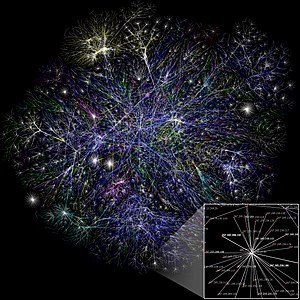Opte Project

The Opte Project, created in 2003 by Barrett Lyon,[1] seeks to generate an accurate representation of the breadth of the Internet using visual graphics.[2][3] Lyon believes that his network mapping can help teach students more about the Internet while also acting as a gauge illustrating both overall Internet growth and the specific areas where that growth occurs.[2] It was not the first such project; others predated it, such as the Bell Labs Internet Mapping Project.
The project has gathered notice worldwide having been featured by Time,[4] Cornell University,[5] New Scientist,[6] and Kaspersky Lab.[7] In addition, Opte Project maps have found homes in at least two art galleries and exhibits such as The Museum of Modern Art[8] and the Museum of Science's Mapping the World Around Us permanent exhibit.[9] To this end, prints of various Opte Project maps are available for purchase online.[10]
At least 3 maps are shown on the Opte website[11] each representing a visual snapshot of the Internet at a specific point in time. The first snapshot was taken in 2003 and the most recent (as of August 8, 2017) was taken in 2015.[12]
All content is licensed under a Creative Commons license[13] and while use of The Opte Image is free for all non-commercial applications, a license fee is required for all others.[10][14]
References
- ^ "The Opte Project - FAQ". www.opte.org. LyonLabs LLC, Barrett Lyon. Retrieved August 8, 2017.
- ^ a b "The Opte Project - About". www.opte.org. LyonLabs LLC, Barrett Lyon. Retrieved August 8, 2017.
- ^ "Visual Complexity - Opte Project section". www.visualcomplexity.com. VisualComplexity.com. Retrieved August 8, 2017.
- ^ "See What the Internet Actually Looks Like". www.time.com. Time, Inc. July 13, 2015. Retrieved August 8, 2017.
- ^ "The Opte Project and Visualizing the Internet". blogs.cornell.edu. Cornell University. September 13, 2016. Retrieved August 8, 2017.
- ^ "Internet mapping project weaves colourful web". www.newscientist.com. New Scientist, Ltd. November 28, 2003. Retrieved August 8, 2017.
- ^ "7 amazing maps of the Internet". www.kaspersky.com. Kaspersky Lab. November 3, 2015. Retrieved August 8, 2017.
- ^ "MOMA - Opte Project item". www.moma.org. Museum of Modern Art. Retrieved August 8, 2017.
- ^ "Mapping the World Around Us". www.mos.org. Museum of Science. Retrieved August 8, 2017.
- ^ a b "The Opte Project - Prints\Licenses". www.opte.org. LyonLabs LLC, Barrett Lyon. Retrieved August 8, 2017.
- ^ "Maps". www.opte.org. Archived from the original on October 9, 2019.
Here you will find static and dynamic 2D JPG/PNG images and 3D VRML maps of the Internet. These maps are built off of our database using two different graphing engines [...]
- ^ "The Opte Project - The Internet". www.opte.org. LyonLabs LLC, Barrett Lyon. Retrieved August 8, 2017.
- ^ "Creative Commons Attribution-NonCommercial 4.0 International (CC BY-NC 4.0) license". creativecommons.org. Creative Commons. Retrieved August 8, 2017.
- ^ "Barrett Lyon Website - Philanthropy section". www.blyon.com. Barrett Lyon. Retrieved August 8, 2017.
External links
- Official website

- A "snapshot" version (courtesy of the "Wayback machine")
